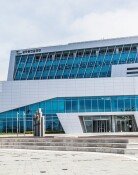Absence of security heads adds to national security woes
Absence of security heads adds to national security woes
Posted May. 30, 2014 01:21,
Head of the National Intelligence Service (NIS) and senior presidential secretary on national security have not been appointed longer than expected since the resignation of the precedents. NIS director leads the nations top spy agency to protect national security and interests. Senior presidential secretary on national security as the head of the National Security Council (NSC) coordinates foreign and security policies and develops countermeasures to make suggestions for the president. President Park Geun-hye has not been nominating the two main pillars of national security since she accepted the resignations of former spy chief Nam Jae-jun and former presidential security adviser Kim Jang-soo more than a week ago. Considering that North Korea is continuing its threatening toward us with random provocations, the absence of the two security heads raise peoples concerns over national security.
In fact, North Korea fired shells against our Navy vessels only three hours after the announcement of the resignations of Nam and Kim last Thursday. It was a surprise attack using the temporary vacuum caused by the resignations. Although North Koreas two shells fell down only 150 meters away from our Navys guided missile patrol gunboat, the NSC meeting could not be held.
North Korea can conduct the fourth nuclear test anytime. Leaving the critical security posts empty may send a signal that the critical moment has passed regardless of actual situations. President Park announced her acceptance for the resignations of the two security heads as she nominated a new Prime Minister nominee. If she recognizes the importance of national security, she should have looked for their replacements before accepting the resignations to minimize the security vacuum.
The protracted appointment of the security heads may lead the members of the National Intelligence Service and the Office of National Security to postponing important decisions. Other agencies can also be affected. Kim Gwan-jin, the Minister of National Defense, and Yun Byung-se, the Minister of Foreign Affairs, are being considered nominees for the presidential secretary on national security, and former and incumbent public officials for the head of the NIS. The long absence of leaders can make it difficult for the organizations member to focus on their work.
Currently, people are more interested in the appointment of new prime minister and what kind of choice Chief Presidential Secretary Kim Ki-choon will make. So, the nomination of the presidential secretary on national security seems to be on the back burner. Posts related to national security should not depend on other factors or situations. The nominee for the NIS head should go through a parliamentary hearing, but does not need to have approval from the National Assembly. Presidential security adviser can be directly appointed by the president. Because both posts do not require recommendation from the prime minister, there is no need to wait until new prime minster is appointed.
Headline News
- N. Korea launches cyberattacks on S. Korea's defense companies
- Major university hospital professors consider a day off each week
- Italy suffers from fiscal deficits from ‘Super Bonus’ scheme
- Inter Milan secures 20th Serie A title, surpassing AC Milan
- Ruling and opposition prioritize spending amid tax revenue shortfalls







